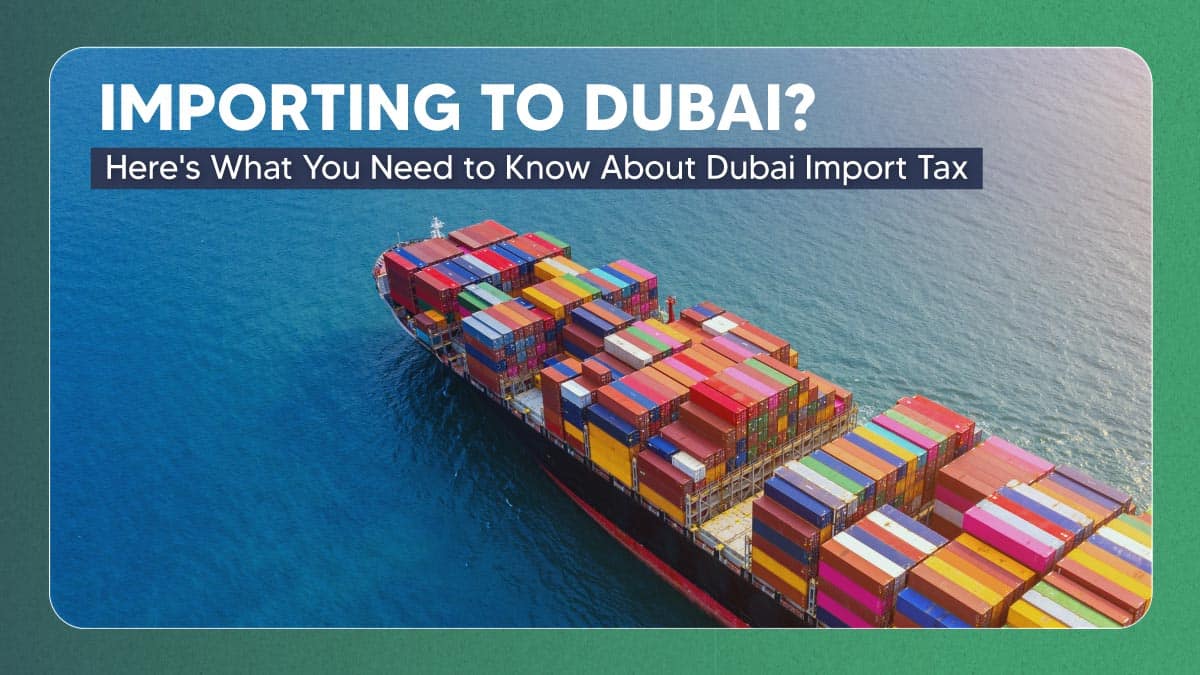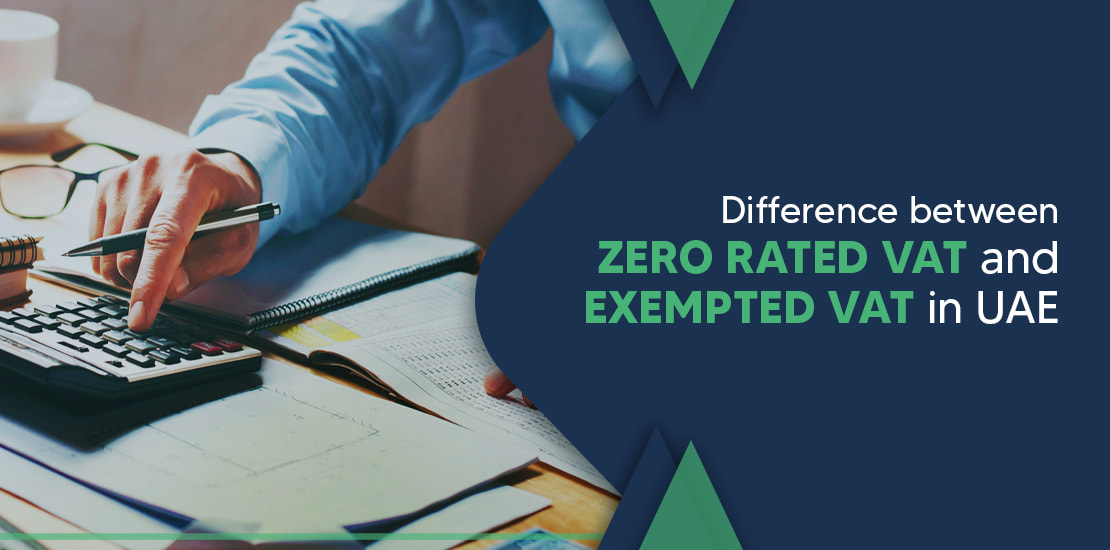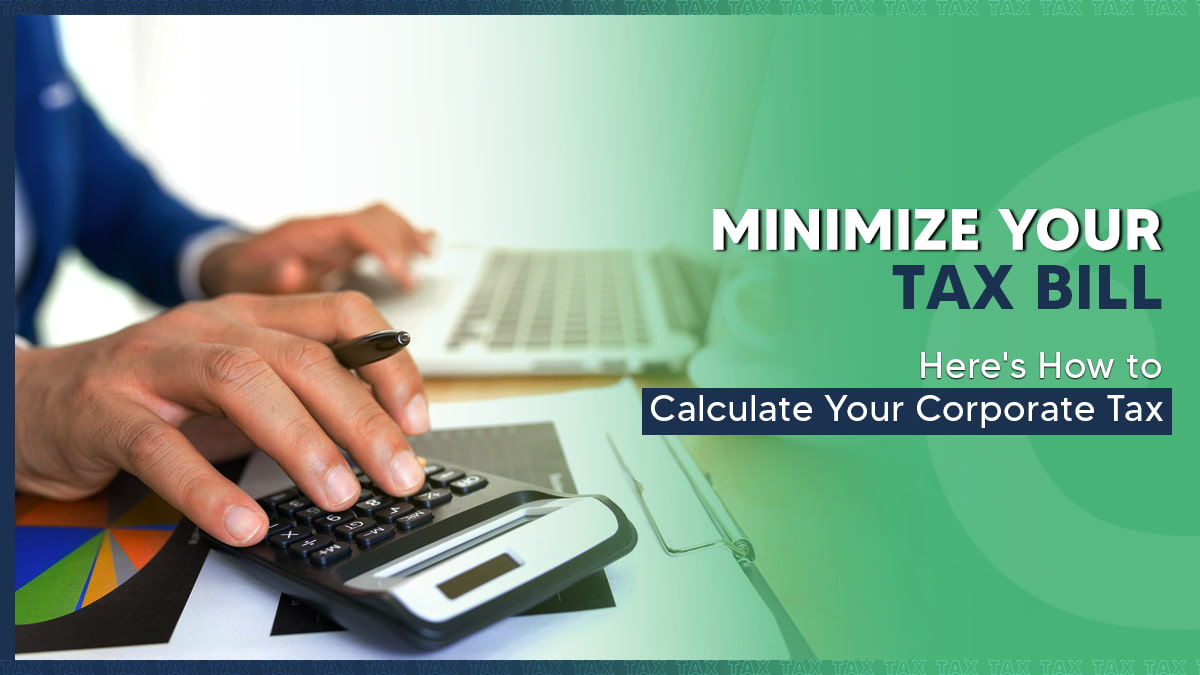Dubai attracts businesses and individuals from all over the world. One important aspect of trading in Dubai is understanding the Dubai import tax system. Import taxes play a crucial role in determining the cost of goods entering the country, whether for personal use or for business purposes.
Dubai import tax system primarily revolves around two key components – Customs Duty & Value Added Tax (VAT). This essentially means the tax is applied to the total value of your goods, including their cost, insurance during transport, and freight charges.
If you’re an importer or just starting out in the world of international trade, having a solid understanding of Dubai’s import tax regulations can help you understand the market more effectively and make informed decisions for your business.
What is Dubai Import Tax?
An import tax is a levy imposed by a government on goods brought into the country. It’s a type of indirect tax that generates revenue for the government and can be used for various purposes like promoting domestic industries, controlling inflation, or raising funds for specific initiatives. Free Trade Zones (FTZs) within Dubai may have different import tax rules.
Dubai’s Import Tax System
Dubai’s import tax system involves three main charges handled by the Dubai Customs department:
Customs Duties: This is a tariff based on the value or quantity of the imported goods. The general rate is a modest 5% of the Cost, Insurance, and Freight (CIF) value of the goods. However, there are exceptions:
- Alcohol: 50% duty
- Cigarettes: 100% duty
Value Added Tax (VAT): A consumption tax applied to most goods and services at a standard rate (currently 5%). This is added to the price of the imported goods after including any customs duty.
Excise Tax: This is a selective tax levied on specific goods considered harmful or luxurious, such as tobacco products and energy drinks. The excise tax rate varies depending on the product category.
General Import Duty Rate in Dubai
The general import duty rate in Dubai is 5%. This is applied to the CIF value of the imported goods.
CIF (Cost, Insurance, and Freight) value refers to the total landed cost of the imported goods. It includes three components:
- Cost: The price you pay for the goods themselves to the seller.
- Insurance: The cost of insuring the goods during transport from the seller to Dubai.
- Freight: The cost of transporting the goods from the seller’s location to Dubai, including any loading and unloading charges.
Essentially, the 5% import duty is calculated based on the total cost of acquiring and bringing the goods to Dubai, which takes into account the initial purchase price, insurance, and transportation expenses.
How Import Tax in Dubai is Calculated
Here’s the formula to calculate the total Dubai import tax:
Total Import Tax = Customs Duty + VAT
Customs Duty = CIF value x Customs Duty Rate (e.g., 5%)
VAT = (CIF value + Customs Duty) x VAT Rate (e.g., 5%)
For example, you’re importing a shirt with a CIF value of AED 100 from a country that doesn’t have a special trade agreement with the UAE. Here’s how the import taxes would apply:
Customs Duty: AED 5 (5% of AED 100)
VAT: AED 5.25 (5% of AED 105, which includes the AED 5 customs duty)
Total Import Tax: AED 10.25
If the imported goods originate from a country with a free trade agreement with the UAE, a reduced or zero customs duty rate might apply.
Exceptions to the General Import Duty Rate
There are several exceptions to this rate, including:
1. Excise Goods
These are specific products considered harmful or luxurious, and they are subject to a higher tax rate than the general rate. This additional tax is called excise tax, and it’s levied on top of any applicable customs duty and VAT. Here are some examples of excise goods and their typical excise tax rates:
- Tobacco Products (including cigarettes): 100%
- Energy Drinks: 50%
It’s essential to note that these are just examples, and the specific excise tax rate can vary depending on the product category.
2. Specific Goods with Different Duty Rates
Certain goods have pre-defined customs duty rates that deviate from the general 5%. For example:
- Alcohol: 50% customs duty rate.
3. Free Trade Agreements (FTAs)
Dubai has Free Trade Agreements with many countries. These agreements often involve reduced or eliminated customs duties in the UAE for goods originating from those partner countries. This promotes trade and strengthens economic ties between Dubai and its FTA partners.
For instance, if you’re importing a garment from a country with a relevant FTA, the import duty might be lower than the general 5% rate, or even zero in some cases.
Factors Affecting Import Duty in Dubai
Several factors can affect the import duty you pay in Dubai:
1. Nature of the Goods
The most significant factor is the type of product you’re importing. Dubai has a categorized system for import duties.
- General Goods: These fall under the standard 5% customs duty rate.
- Excise Goods: These specific products (like tobacco and energy drinks) are subject to a higher excise tax on top of any customs duty and VAT.
- Restricted Goods: Some goods, like weapons or pork products, are entirely banned from import.
- Specific Duty Rates: Certain goods have pre-defined customs duty rates that differ from the general 5%.
2. Origin of the Goods
Dubai has Free Trade Agreements (FTAs) with various countries. If the goods originate from a country with a free trade agreement with the UAE, you might benefit from reduced or zero customs duty rates.
3. Value of the Goods
While the general duty rate is a percentage, the total import tax you pay is ultimately influenced by the value of the goods (CIF value). Higher-value goods will naturally incur a higher total import tax amount even with the same duty rate.
4. Free Zones
Importing goods into specific designated Free Zones within Dubai might be exempt from customs duties. However, these zones may have their own set of regulations and potential fees.
5. Purpose of Import
Commercial imports typically have higher duty rates compared to personal imports for individual use.
Import Tax Exemptions in Dubai
Free Trade Agreements are the most significant way to achieve lower or zero import duties in the UAE. There might also be exemptions or duty guarantees for specific situations like importing goods for exhibitions or re-export purposes.
However, these typically involve procedures and guarantees to ensure the goods eventually leave the country.
Dubai Customs allows exemptions for used personal effects and household items brought in by returning residents or newcomers. There are conditions to meet, such as proof of residency and quantities appropriate for furnishing a house.
Certain designated Free Zones within Dubai might exempt goods brought in from customs duties.
Procedure to Claim for Import Tax Exemption
The procedure for claiming import tax exemption in Dubai depends on the reason for the exemption.
1. Importing Personal Effects and Household Items
This applies to nationals returning to Dubai or foreigners coming to reside in Dubai for the first time.
You will need to submit the following documents at customs:
- A packing list detailing the contents of the shipment
- Proof of residence abroad for nationals
- Proof of work and residency visa for foreigners
2. Importing Industrial Inputs (Machinery, Equipment, and Raw Materials):
This applies to businesses registered in the UAE.
You will need to apply online through the Ministry of Industry and Advanced Technology (MoIAT) e-services platform.
The process involves:
- Registering or logging in to the platform
- Completing the Customs Exemption Request Form
- Paying any applicable fees
- Downloading a copy of the application for your customs declaration
In some cases, you can claim a refund or drawback on import duties in the UAE if they were overcharged due to errors in classification, valuation, or calculation of the duty. This typically involves a process of filing a claim with the customs authorities within a specific timeframe.
Let Shuraa Tax Be Your Guide!
Importing goods into Dubai can be a great business opportunity, but understanding the Dubai import tax system is crucial for smooth operations and accurate cost calculations.
Shuraa Tax is here to simplify your UAE taxation journey. Our team of knowledgeable and qualified accountants, auditors, and tax advisors can provide comprehensive assistance with Dubai import tax, UAE VAT, tax management, and accounting services across various Emirates.
Contact Shuraa Tax today and let us handle the complexities, so you can focus on your business growth. Get in touch today at +971508912062. You can also drop us an email at info@shuraatax.com.












